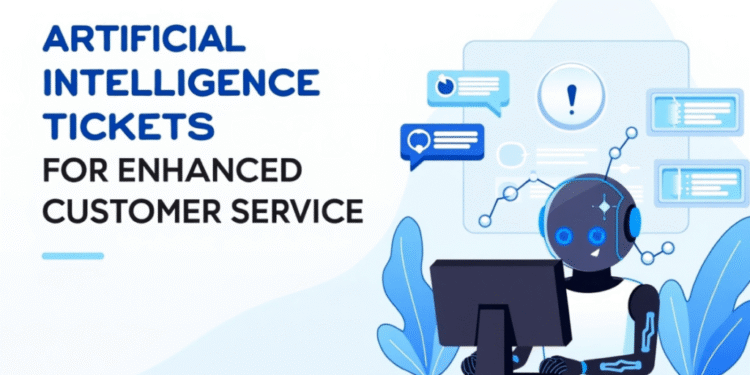In today’s fast-paced digital environment, customer service has evolved beyond simple call centers and email responses. One of the most impactful transformations in the field is the rise of Artificial Intelligence (AI) tickets—a system that automates, prioritizes, and enhances the way businesses manage customer inquiries. Powered by Large Language Models (LLMs), these AI ticketing systems are redefining how companies serve their customers, reduce wait times, and streamline operations.
What Are Artificial Intelligence Tickets?
AI tickets refer to customer service queries that are generated, categorized, and sometimes resolved by artificial intelligence. Unlike traditional systems where a human agent logs and assigns tickets, AI-powered systems can automatically understand customer intent, assign priority, and route the ticket to the appropriate department or even resolve it autonomously.
Key Features:
-
Automated classification of issues (billing, technical, order status, etc.)
-
Natural Language Understanding (NLU) for interpreting complex requests
-
Integration with chatbots and CRM platforms
-
24/7 availability to ensure round-the-clock support
The Role of Large Language Models (LLMs)
Large Language Models like GPT, Claude, and Gemini are now being integrated into AI ticketing platforms to deliver more intelligent and contextual interactions.
How LLMs Improve Ticketing Systems:
-
Human-like Understanding
LLMs can understand the nuance, tone, and urgency in a customer’s message—whether it’s polite, frustrated, or confused—and adjust the ticket priority accordingly. -
Smart Suggestions
Agents receive AI-generated suggestions for responses, drastically reducing their time to resolution (TTR). -
Automatic Resolution
For simple or repetitive queries (like password resets, shipping status, etc.), LLMs can auto-resolve the issue without human intervention. -
Multilingual Support
LLMs can translate and respond to tickets in multiple languages in real time, expanding global support reach.
Benefits for Businesses
✅ Faster Response Time
AI ticketing systems instantly categorize and assign tickets, eliminating manual lag.
✅ Scalability
Even during peak hours or global events, AI can handle thousands of tickets simultaneously without compromising quality.
✅ Cost Reduction
Fewer human resources are needed for L1 support, allowing companies to allocate agents to more complex tasks.
✅ Improved CSAT Scores
Faster, smarter, and more relevant responses lead to higher customer satisfaction.
Use Cases Across Industries
-
E-commerce: Order tracking, returns, and product inquiries
-
Telecommunications: Network outages, plan upgrades, billing issues
-
Banking & FinTech: Fraud detection, transaction issues, KYC support
-
Travel & Hospitality: Booking changes, itinerary updates, cancellation queries
The Future of AI Tickets in Customer Service
As AI models continue to evolve, the future holds even more intelligent, self-learning ticketing systems. Predictive customer service—where AI can anticipate and preemptively solve issues—is already being explored by innovators in the space.
Expect features like:
-
Emotion detection for prioritizing upset customers
-
Sentiment analysis dashboards for real-time team performance
-
Agent Assist tools where AI co-pilots guide human reps through complex interactions
Conclusion
Artificial Intelligence tickets, powered by Large Language Models, are not just a trend—they’re the future of efficient, responsive, and scalable customer service. For businesses aiming to stay competitive in 2025 and beyond, adopting AI ticketing systems is no longer optional—it’s essential.
Whether you’re a startup or an enterprise, the integration of AI in your support pipeline can lead to higher efficiency, improved customer satisfaction, and better overall service delivery.




